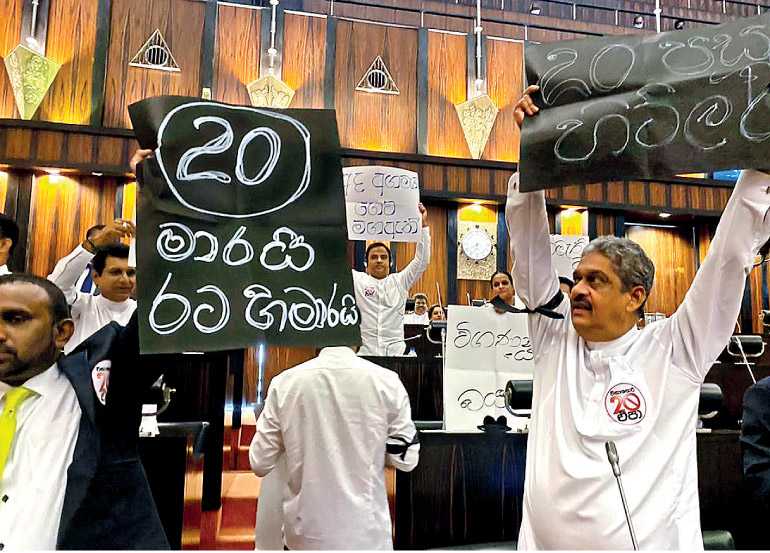Tuesday Feb 17, 2026
Tuesday Feb 17, 2026
Thursday, 24 September 2020 00:20 - - {{hitsCtrl.values.hits}}

How should this Government interpret the people’s mandate? With restraint
Déjà vu?
Once upon a time, a mighty government with a two-thirds majority in Parliament engaged in political opportunism, and radically changed the Constitution of Sri Lanka. It ignored more than a decade of public demands for reducing the powers of the executive president and proceeded to strengthen that office. It presumed that its great popularity, which swept it to power after it ended a 30-year war, would last forever. 
The year was 2010, and that Government made a fatal mistake in overestimating its popular mandate. Just five years later it was rudely ousted – incidentally by a political opposition that promised to reduce the powers of the executive president.
The story then took a predictable turn. The new Government that replaced the old also overestimated its mandate. It embarked on an ambitious reform project to overhaul the constitution, and replace it with a brand new basic law. The project, while admirable in some respects, became mired by disagreement, and sapped the scarce time and energy of legislators and experts.
In hindsight, the opportunity cost was unmistakable. The time and energy expended on grand constitutional plans would have been better spent on running an efficient economy, ensuring accountability for crimes, brokering better coordination between president and prime minister, and delivering on human developmental goals.
There are then two lessons we can learn from these past mistakes: first, do not mistake a momentary popular mandate for a complete abandonment of long-term demands; second, do not rush to overhaul a Constitution when there are more urgent legislative priorities to attend to.
In 2020, we are witnessing a familiar story of overoptimistic constitutional reform. An almighty Government with unprecedented popular support seems intent on repeating the mistakes of the recent past. Not only is it about to strengthen the power of the Executive, just as it did in 2010, it is also about to rush into a new constitution-making project.
It is strange that a Government that promised to be different from its predecessors is seeking to emulate them.
From crisis management to human development
How should this Government interpret the people’s mandate? With restraint.
The 19th Amendment (19A) to the Constitution was portrayed as the source of chaos and inefficiency during the previous Government’s tenure. So the current Government promised to repeal 19A during its election campaign. But it’s a mistake – and a fatal one – to treat the people’s disdain for chaos and inefficiency as a long-term endorsement of the concentration of power.
Perhaps the people will momentarily endorse such concentration to manage a crisis – such as the current COVID-19 pandemic. But that’s what ordinary emergency law is for. The Government should be enacting a new public health emergency law – not altering the Constitution.
Crisis management is not a perpetual attraction for the Sri Lankan people. One of two things can happen when a government that projects itself as a crisis manager comes to power. It can either succeed in managing the crisis, and the people’s priorities would shift, or it can fail to manage the crisis, and the people’s loyalties would shift. Either way, this Government must graduate to deliver what the people truly, and ultimately, want – not radical constitutional reform, but human development.
The immediate legislative agenda of the Government should surely be to stimulate the economy, to support industry, to strengthen social welfare, and to improve the resilience of the education and health sectors. There is so much on the human development front that ‘needs to be done’.
Many people who voted for Gotabaya Rajapaksa in November 2019, and the Sri Lanka Podujana Peramuna (SLPP) in 2020, thought they were getting a highly-capable and efficient Government that can ‘get things done’. If the President and the SLPP succeed in delivering on that promise, their voters will be vindicated. But if the President and the SLPP launch a reform project that is seen as nothing more than self-serving politicking, they too will be rejected like their predecessors. An opposition that effectively wields the language of human development will soon become an attractive alternative.
Is reform needed for delivery?
There is a time and place for constitutional reform. The committee that was recently appointed to draft a new constitution should build on the work of numerous other committees that came before it, and produce a draft that captures the long term aspirations of the people – all the people; the draft must address the concerns of everyone, and advance equal citizenship, as opposed to ethnic, religious or class privilege.
The committee must produce a draft that is not merely a reflection of present priorities, but one that will endure beyond this Government. Yet this reform project must not be rushed, and it certainly must not monopolise the country’s immediate legislative agenda.
Why introduce a 20th Amendment (20A) when broader constitutional reform is on the horizon? The 20A’s proponents may claim it is urgently needed to empower the Executive President to efficiently deliver on his promises. But that claim is peculiar given that the present constitutional scheme works well enough if there was cooperation between the Executive and Legislature.
Of course, we would encounter a problem if the president and prime minister came from two different parties. We saw such a stalemate in the early 2000s – well before 19A was even thought of. But why should that problem arise when the same party comfortably controls both the Executive and the Legislative organs of Government? Why should this Government fear dialogue and cooperation between President and Prime Minister when they not only come from the same party, but also from the same family?
Proponents of 20A may also argue that it is urgently needed to strengthen national security following the tragic debacle of Easter Sunday 2019. But the Government has already interpreted the Constitution to give itself wide-ranging security powers, and to permit the President to hold the Defence Ministry portfolio. If such power was not already provided under the Constitution, many decisions made during the past 10 months would be void. Surely, the Government cannot think so. So why spend precious time and resources trying to hastily amend the Constitution to explicitly grant the President powers he claims to already have?
These are questions that haunt not only the constitutional scholar or the political analyst but also the ordinary citizen who voted for Rajapaksa and the SLPP: the industrialist, the teacher, the healthcare worker, the farmer, the shopkeeper. These ordinary citizens will wonder why, instead of getting down to business in the midst of a crisis, this Government has launched an ambitious constitutional reform project. These Sri Lankan voters are not interested in grand constitutional change. They are ultimately interested in a decent life for themselves and for their children.
We all know how this story ends. If the present Government does not learn from past mistakes and correct its course, Sri Lankan voters will eventually reject it.